» posted on Tuesday, December 11th, 2012 by Linda Lou Burton
Listening For Stories
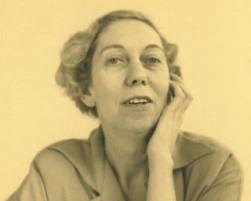 Linda Burton posting from Jackson, Mississippi – I heard a little inside story about Eudora Welty today but I can’t say who told it. It may or may not be true; but it could be. The story goes like this: Eudora didn’t go to the beauty parlor every week like some women do; but when she went it was always to the same place. One of the ladies who saw her there from time to time commented to another, “She’s a bitter woman. Nothing good to say.” Now, anyone who knew Eudora knew she was anything but bitter. In the years since her death, they have pondered that woman’s comment and concluded it was Eudora’s way of “sparking” a story – throwing out a line that would get people talking. And then she’d sit back and listen! Fodder for writing. On one of the interpretive panels in the Welty Museum I read these words: Welty never stopped listening, her skills at recreating southern life and its stories was based on “eavesdropping” and on living for decades in the place where she grew up. “Once you have heard certain expressions, sentences,” she wrote, “you almost never forget them. It’s like sending a bucket down a well and it always comes back up full.”
Linda Burton posting from Jackson, Mississippi – I heard a little inside story about Eudora Welty today but I can’t say who told it. It may or may not be true; but it could be. The story goes like this: Eudora didn’t go to the beauty parlor every week like some women do; but when she went it was always to the same place. One of the ladies who saw her there from time to time commented to another, “She’s a bitter woman. Nothing good to say.” Now, anyone who knew Eudora knew she was anything but bitter. In the years since her death, they have pondered that woman’s comment and concluded it was Eudora’s way of “sparking” a story – throwing out a line that would get people talking. And then she’d sit back and listen! Fodder for writing. On one of the interpretive panels in the Welty Museum I read these words: Welty never stopped listening, her skills at recreating southern life and its stories was based on “eavesdropping” and on living for decades in the place where she grew up. “Once you have heard certain expressions, sentences,” she wrote, “you almost never forget them. It’s like sending a bucket down a well and it always comes back up full.”
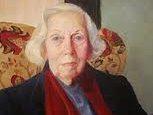 Eudora Alice Welty (1909-2001) was a Pulitzer author of international acclaim who was born, and died, in Jackson, Mississippi. Though her stories and novels were set in the south, she did not consider herself a southern writer; she traveled and lived in New York, San Francisco, Mexico, Europe; her friends included authors and artists from around the world. But her love of the south, and the people living there, comes through in every word she wrote; gentle perceptions overlain with a fierce wit, always ringing true.
Eudora Alice Welty (1909-2001) was a Pulitzer author of international acclaim who was born, and died, in Jackson, Mississippi. Though her stories and novels were set in the south, she did not consider herself a southern writer; she traveled and lived in New York, San Francisco, Mexico, Europe; her friends included authors and artists from around the world. But her love of the south, and the people living there, comes through in every word she wrote; gentle perceptions overlain with a fierce wit, always ringing true.
More from the Welty Museum exhibit panels:
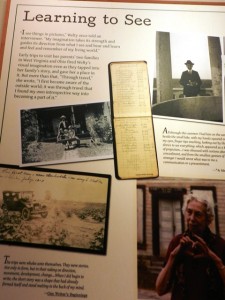 “I see things in pictures,” she once told an interviewer. “My imagination takes its strength and guides its direction from what I see and hear and learn and feel and remember of my living world.”
“I see things in pictures,” she once told an interviewer. “My imagination takes its strength and guides its direction from what I see and hear and learn and feel and remember of my living world.”
It is through place that we put down roots, wherever birth, chance, fate or our traveling selves set us down….Through travel I first became aware of the outside world. It was through travel that I found my own introspective way into becoming a part of it….The trips were wholes unto themselves. They were stories. Not only in form, but in their taking on direction, movement, development, change….When I did begin to write, the short story was a shape that had already formed itself and stood waiting in the back of my mind.
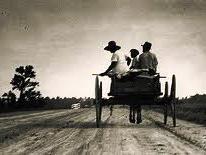 During the Depression years of the 1930’s Welty traveled through Mississippi on assignment for the WPA and took hundreds of photographs; “life as I found it, all unposed.” Photography taught her that “life doesn’t hold still. A good snapshot stops a moment from running away.” Capturing a human moment in photography however wasn’t enough. “I felt the need to hold transient life in words,” she wrote. “There’s so much more of life that only words can convey.”
During the Depression years of the 1930’s Welty traveled through Mississippi on assignment for the WPA and took hundreds of photographs; “life as I found it, all unposed.” Photography taught her that “life doesn’t hold still. A good snapshot stops a moment from running away.” Capturing a human moment in photography however wasn’t enough. “I felt the need to hold transient life in words,” she wrote. “There’s so much more of life that only words can convey.”
Today I immersed myself in Welty life in my two-hour visit to the Museum and to the home Eudora lived in for most of her life. I walked through the gardens where camellias and roses still bloom beneath tall southern pines. I stood in the kitchen where Eudora and her mother cooked; the house has been restored to a 1980’s look (her last active writing period) but in earlier days it had a wood stove and an ice box; they have pictures you can see. The ice box was built into the wall; the iceman delivered new blocks through an opening on the back porch.
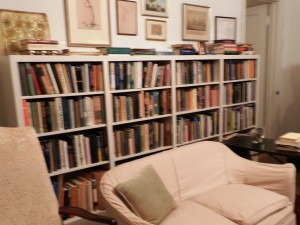 On the wall in her study hangs a hand-penned note from E M Forster (English author, 1879-1970) expressing his admiration for her and for her work. Pictures of Eudora with her mother, brothers, nieces, and friends are scattered here and there. On the table in her dining room the pages of a manuscript are spread; paragraphs cut and
On the wall in her study hangs a hand-penned note from E M Forster (English author, 1879-1970) expressing his admiration for her and for her work. Pictures of Eudora with her mother, brothers, nieces, and friends are scattered here and there. On the table in her dining room the pages of a manuscript are spread; paragraphs cut and 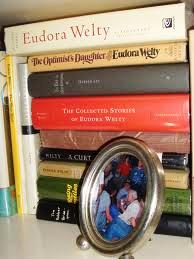 moved and pinned in a new position with straight pins; she never switched to computers or even an electric typewriter until right at the last; they made too much noise, she said. Books are everywhere; there’s a casual comfortable charm. The painting over the mantle came from a trip to Santa Fe after her mother died. She wrote The Optimist’s Daughter after that; it’s the book that earned her the Pulitzer.
moved and pinned in a new position with straight pins; she never switched to computers or even an electric typewriter until right at the last; they made too much noise, she said. Books are everywhere; there’s a casual comfortable charm. The painting over the mantle came from a trip to Santa Fe after her mother died. She wrote The Optimist’s Daughter after that; it’s the book that earned her the Pulitzer.
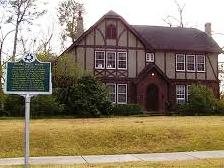 The house belongs to the state of Mississippi now, administered by the Mississippi Department of Archives and History. Eudora made arrangements to donate the house and her belongings to the state after she died; it is one of the nation’s most intact literary house museums; a National Historic Landmark and open to the public.
The house belongs to the state of Mississippi now, administered by the Mississippi Department of Archives and History. Eudora made arrangements to donate the house and her belongings to the state after she died; it is one of the nation’s most intact literary house museums; a National Historic Landmark and open to the public.
Our family house and the Music Building of Belhaven College stood directly across the street from each other. Drifting out through the open windows of the practice rooms opposite and, floating across Pinehurst Street, in through the open windows of my upstairs room where I sat at the typewriter working, came the clear, searching, repeating sounds of piano practice.
I could almost hear it myself as the tour guide led me through today; the music from across the street; the typewriter keys clicking away; the pause. Footsteps on the stairs as she came 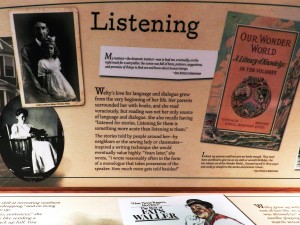 down for a tomato sandwich for lunch. The sounds of one very special woman, listening.
down for a tomato sandwich for lunch. The sounds of one very special woman, listening.
”Long before I wrote stories, I listened for stories,” she wrote in 1984. ”Listening for them is something more acute than listening to them. I suppose it’s an early form of participation in what goes on. Listening children know stories are there. When their elders sit and begin, children are just waiting and hoping for one to come out, like a mouse from its hole.”
Eudora Welty received 38 honorary doctorate degrees and more than 40 major literary awards in her lifetime. She toured and lectured around the world, though refusing always to speak before any audience that was segregrated. Her published works include over 40 short stories, 5 novels, 3 works of nonfiction, and one children’s book.
Eudora Welty House Museum in Jackson, Mississippi http://mdah.state.ms.us/welty/
The Eudora Welty Foundation http://eudorawelty.org/
Timeline of Eudora Alice Welty’s Life
April 13, 1909 – Eudora born in Jackson, Mississippi, at 741 N Congress Street
1912 – Brother Edward Welty born
1915 – Brother Walter Welty born
1925 – Graduates from Jackson’s Central High School
1925-27 – Attends Mississippi State College for Women, Columbus, Mississippi
1927-29 – Attends and graduates from the University of Wisconsin, Madison, Wisconsin
1930-31 – Attends Columbia University School of Business
1931 – Christian Webb Welty, Eudora Welty’s father, dies
1931-34 – Eudora works in Jackson at WJDX radio station
1933-35 – Eudora writes Jackson society columns for the Memphis Commercial-Appeal
1936 – Eudora publishes her first stories, “Death of a Traveling Salesman” and “Magic,” in Manuscript magazine, has a one-woman photographic exhibit in New York City, and works for the Works Progress Administration
1937 — Eudora has a second photographic exhibit in New York city and travels to Mexico with three Jackson friends
1937-39 – Eudora publishes ten stories in the Southern Review, Prairie Schooner, River
1939 – Eudora works for the Mississippi Advertising Commission
1940 – Diarmuid Russell becomes Eudora Welty’s agent
1941 – Eudora publishes stories in the Atlantic Monthly and Harper’s Bazaar. Her first book of stories, A Curtain of Green, is published
1942 – The Robber Bridegroom
1943 – The Wide Net
1944 – Eudora works for several months as a copy editor and staff reviewer for the New York Times Book Review
1946 – Delta Wedding
1946-47 – Eudora has two extended stays in San Francisco
1949 – The Golden Apples
1949-50 – Eudora travels through Europe on a Guggenheim Fellowship
1951 – Eudora spends a few months in England and Ireland
1952 – Elected to the National Institute of Arts and Letters
1954 – Eudora lectures at Cambridge University in England and publishes The Ponder Heart
1955 – The Bride of the Innisfallen; Eudora receives Howell’s Medal from Academy of Arts and Letters
1956 – Jerome Chodorov’s and Joseph Fields’s dramatization of The Ponder Heart runs on Broadway
1959 – Eudora’s brother Walter dies
1963 – Eudora publishes “Where is the Voice Coming From?” in The New Yorker
1966 – Eudora’s mother Chestina and her brother Edward die
1966 – “The Demonstrators” appears in The New Yorker
1969 – “The Optimist’s Daughter” appears in The New Yorker
1970 – Eudora publishes Losing Battles, a novel begun in 1955
1971 – Eudora’s book of photographs, One Time, One Place, is published, and she is elected to American Academy of Arts and Letters
1972 – The Optimist’s Daughter in revised and expanded form is published, and Eudora receives the Gold Medal for Fiction from the National Institute of Arts and Letters
1973 – The Optimist’s Daughter receives a Pulitzer Prize; the state of Mississippi establishes May 2 as Eudora Welty Day
1974 – Eudora travels through Italy and France
1976 – Alfred Uhry’s dramatization of The Robber Bridegroom runs on Broadway
1978 – The Eye of the Story
1979 – Artist-in-residence, British Studies Program, Associated Colleges of the South, held at Oxford University
1980 – The Collected Stories of Eudora Welty; Eudora receives Presidential Medal of Freedom from President Jimmy Carter
1983 – Eudora delivers the William E. Massey Sr Lectures in the History of American Civilization at Harvard University
1984 – One Writer’s Beginnings; Eudora travels to England and Italy
1986 – Eudora receives National Medal of the Arts
1990 – Travels to London
1991 – Norton Book of Friendship, co-edited with Ronald A Sharp
1996 – Receives French Legion of Honor in ceremony held at the Old Capitol Museum in Jackson
1998 – The Library of America publishes two volumes of Eudora’s fiction and non-fiction, making her the first living writer whose works have become part of this distinguished series
2001 – Eudora Welty dies July 23

